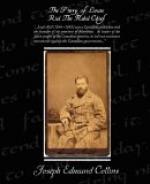Some time before the outbreak, Riel, in company with a half-breed, had gone in the autumn shooting chicken along the prairies. The hunting-ground was many miles distant from Riel’s home, so that the intention of the sportsmen was to trust themselves to the hospitality of some farm-house in the neighbourhood. The settlers were all, with two or three exceptions, Metis; and the door of the half-breed is never shut against traveller or stranger. One late afternoon, as the two men were passing along the prairie footpath towards a little settlement, they heard at some distance over the plain, a girl singing. The song was exquisitely worded and touching, and the singer’s voice was sweet and limpid as the notes of a bobolink. M. Riel, like Mohammed, El Mahdi, and other great patrons of race and religion, is strong of will; but he is weaker than a shorn Samson when a lovely woman chooses to essay a conquest. So he marvelled much to his companion as to who the singer might be, and proposed that both should leave the path and join the unknown fair one. A few minutes walk brought the two beyond a small poplar grove, and there, upon a fallen tree-bole, in the delicious cool of the autumn evening, they saw the songstress sitting. She was a maiden of about eighteen years, and her soft, silky-fine, dark hair was over her shoulders. In girlish fancy she had woven for herself a crown of flowers out of marigolds and daisies, and put it upon her head. She did not hear the footsteps of the men upon the soft prairie, and they did not at once reveal themselves, but stood a little way back listening to her. She had ceased her song, and was gazing beyond intently. On the naked limb of a desolate, thunder-riven tree that stood apart from its lush, green-boughed neighbours, sat a lonely thrush in seeming melancholy. Every few seconds he would utter a note of song. Sometimes it was low and sorrowful, then it was louder, with the same sad quality in it, as if the lonely bird were calling for some responsive voice from far away over the prairie.
“Dear bird, you have lost your mate, and are crying out for her,” the girl said, stretching out her little brown hand compassionately toward the low-crouching songster. “Your companions have gone to the South, and you wait here trusting that your mate will come back, and not journey to summer lands without you. Is not that so, my poor bird? Ah, would that I could go with you where there are always flowers, and ever can be heard the ripple of little brooks. Here the leaves will soon fall, ah, me! and the daisies wither, and instead of the delight of summer we shall have only the cry of hungry wolves, and the bellowing of bitter winds above the ghastly plains. But could I go to the South, there is no one who would sing over my absence one lamenting note, as you sing, my bird, for the mate with whom you had so many hours of sweet lovemaking in these prairie thickets. Nobody loves me woos me, cares for me, or sings about me. I




